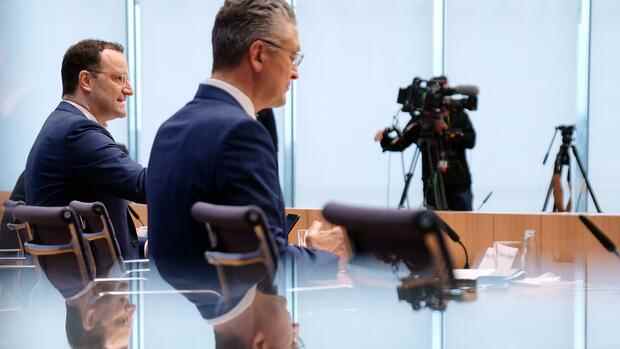Berlin If the corona pandemic in Germany were a tanker, it would be leading towards the quay wall at full speed. If one were to turn things around now, then the tanker would probably still ram the wall sideways, said the head of the Robert Koch Institute (RKI), Lothar Wieler, on Friday in a joint press conference with the acting Federal Minister of Health Jens Spahn (CDU) . But it would no longer hit the wall head-on and tear it down.
The minister referred to the sometimes dramatic situation in the hospitals. Last week in Munich there were still three percent free intensive care beds, which is “actually nothing”. Patients will have to be relocated across regions, possibly also to neighboring countries.
If no massive countermeasures are taken now, there could be a lockdown again, said the Minister of Health. “We are in a position where nothing should be ruled out.”
Top jobs of the day
Find the best jobs now and
be notified by email.
The RKI reported 52,970 new corona infections within 24 hours on Friday. The seven-day incidence, i.e. the number of new corona cases per 100,000 inhabitants within one week, rose to 340.7.
In twelve counties, the seven-day incidence has risen to over 1,000
According to Wieler, the incidence has already risen to over 500 in a quarter of the districts, in twelve districts it is more than 1000. “All of Germany is one big outbreak, that is a national emergency,” said the RKI boss. On many days, between 200 and 300 deaths are recorded, and in many places medical care is no longer guaranteed.
The vaccination rate, even with booster vaccinations, must be significantly accelerated, especially children and the elderly need special protection, said Wieler. But that is not enough to break the fourth wave. Therefore, major events should be canceled, the number of participants limited for smaller events, clubs and bars closed, the doctor recommended. If you act today, you won’t see the effect for another two weeks.
The so-called hospitalization incidence was 5.3 on Thursday. It indicates how many corona infections per 100,000 inhabitants required hospital treatment. The RKI points out, however, that a hospital stay is often only necessary after an infection.
The federal and state governments decided on Thursday that the hospitalization rate should be the benchmark for required restrictions in the states. For example, if the rate in a federal state exceeds three, a 2G rule is provided. Only those who have been vaccinated and those who have recovered will then have access to events, restaurants or cultural institutions.
If the incidence of hospitalization exceeds the threshold of six, people who have been vaccinated or recovered must also be tested (2G plus) before they can go to dinner or to the theater. From a threshold of nine, the federal states can impose additional restrictions if they deem it necessary.
The vaccination campaign is to be accelerated. In the summer, only around 20,000 doctor’s offices had vaccinated, and in the meantime there have been more than 45,000, said Spahn. But this is still below the temporary high of 75,000.
Medical associations are calling for all forces to be mobilized for the vaccination campaign
Last week, doctors, clinics and vaccination centers or outpatient departments ordered four million vaccine doses, this week another four and six million for the coming week, said the health minister. “So we see that the pace is increasing significantly.” So far 5.2 million booster vaccinations have been given.
In a joint declaration, the German Hospital Association, the German Medical Association, the Marburg Association and associations of specialist and hospital doctors called for “a political concept to substantially increase first and second vaccinations” and rapid booster vaccinations. “It is now a matter of standing together and mobilizing all forces for the fastest possible implementation of these booster vaccinations in practices, in clinics, in vaccination centers and by company doctors or mobile vaccination teams,” the statement said.
In order to accelerate the vaccination campaign, nurses and dentists should also be allowed to vaccinate, demanded the relevant professional associations. The governing federal government has just raised the reimbursement for each vaccination from 20 to 28 euros, and at the weekend there is a surcharge of eight euros. Spahn said that federal funding for the vaccination centers was also secured until the end of May next year.
Accelerating the vaccination campaign alone will not be enough, stressed the minister. “We are in a national emergency that also needs a joint national effort.” Therefore, it is good that the federal and state governments have promised to review the amendment to the Infection Protection Act decided on Thursday by December 9th at the latest and to sharpen the measures if necessary.
More: The first sectors in Germany are calling for mandatory vaccinations at the workplace.
